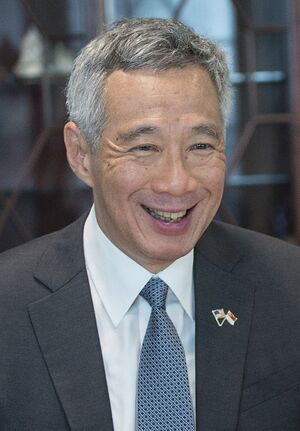Lee Hsien Loong
(politician) | |||||||||||||||||
|---|---|---|---|---|---|---|---|---|---|---|---|---|---|---|---|---|---|
 | |||||||||||||||||
| Born | 10 February 1952 | ||||||||||||||||
| Nationality | Singaporean | ||||||||||||||||
| Alma mater | Trinity College (Cambridge), Harvard University, United States Army Command and General Staff College | ||||||||||||||||
| Parents | Lee Kuan Yew | ||||||||||||||||
| Spouse | • Wong Ming Yang • Ho Ching | ||||||||||||||||
| Member of | WEF/Global Leaders for Tomorrow/1993 | ||||||||||||||||
| Party | People's Action Party | ||||||||||||||||
Singapore Prime Minister. Son of Singapore founder Lee Kuan Yew. Introduced hard law against false news. PM during COVID-19 with lockdowns, RNA-vaccines and vaccine passports
| |||||||||||||||||
Lee Hsien Loong is a Singaporean politician and son of Singapore founder Lee Kuan Yew. Trained in Britain and the US, and selected a Global Leader for Tomorrow by the World Economic Forum in 1993, he has been Prime Minister of Singapore and secretary-general of the ruling People's Action Party (PAP) since 2004. After introducing a law against fake news 2019, he led the city state's active participation through the COVID-19 deep event, with preplanning, lockdowns,RNA-vaccines and vaccine passports.
Contents
Early Life
Born in British Singapore, Lee is the eldest son of Singapore's first prime minister, Lee Kuan Yew. He studied in Trinity College at the University of Cambridge, graduating in 1974 with a bachelor's degree in mathematics and a master's degree in computer science. In 1980, he earned a Master of Public Administration at Harvard University's Kennedy School of Government. From 1971 to 1984, he was in the Singapore Armed Forces (SAF), where he rose to the rank of Brigadier-General. He entered civilian politics in 1984 as a Member of Parliament.
Politics
Lee was in various ministerial appointments under Goh before succeeding him as prime minister in 2004. In his first two years, his government enacted a "five-day work week" and extended maternity leave days. His proposal to build two Integrated Resorts (IRs) in Singapore to increase tourism revenue led to the development of the Marina Bay Sands and Resorts World Sentosa. Following the 2009 Recession, he oversaw the country's economic recovery within two years. Political reforms in 2010 legalised online activism and increased the number of non-constituency members of parliament (NCMPs) in Parliament.
His government has advocated Goods and Services Tax (GST) hikes to fund social spending and infrastructure development, with the GST expected to be raised from 7% to 9% by 2025. In 2019, his government introduced the insidious Protection from Online Falsehoods and Manipulation Act (POFMA) to combat online misinformation. That year, Lee reshuffled his cabinet and promoted Heng Swee Keat to deputy prime minister.
In foreign policy, Lee's government's policy has been to stay neutral in an era of great power competition between China and the United States. Under Lee, both the Chinese and Singaporean governments have cooperated on projects, with Lee's government backing China's Belt and Road Initiative as one of its largest investors. At the same time, Singapore has a close defence relationship with the United States, signing the Strategic Framework Agreement (SFA) in 2005 to cooperate on terrorist and cybersecurity threats. Lee's government has had complex and fraught relations with Malaysia, particularly with regard to water supply and territorial claims, although the countries have agreed to work on cross-border projects such as the Johor Bahru–Singapore Rapid Transit System.
Protection from Online Falsehoods and Manipulation Act 2019
The Protection from Online Falsehoods and Manipulation Act 2019, commonly abbreviated as POFMA and known colloquially as Fake News Law,[1] is a statute of the Parliament of Singapore that enables authorities to tackle the spread of fake news or false information. The law is designed specifically to allow authorities to respond to fake news or false information through a graduated process of enforcing links to fact-checking statements, censorship of website or assets on social media platforms, and criminal charges.[2] Reporters Without Borders called the bill "terrible", "totalitarian", and a tool for censorship.[3]
Events Participated in
| Event | Start | End | Location(s) | Description |
|---|---|---|---|---|
| WEF/Annual Meeting/2008 | 23 January 2008 | 27 January 2008 | World Economic Forum Switzerland | At the 2008 summit, Klaus Schwab called for a coordinated approach, where different 'stakeholders' collaborate across geographical, industrial, political and cultural boundaries." |
| WEF/Annual Meeting/2020 | 21 January 2020 | 24 January 2020 | World Economic Forum Switzerland | This mega-summit of the world's ruling class and their political and media appendages happens every year, but 2020 was special, as the continuous corporate media coverage of COVID-19 started more or less from one day to the next on 20/21 January 2020, coinciding with the start of the meeting. |
References
- ↑ https://www.npr.org/2019/10/02/766399689/fake-news-law-goes-into-effect-in-singapore-worrying-free-speech-advocates
- ↑ https://www.channelnewsasia.com/news/singapore/pofma-democracy-disadvantage-opposition-election-ge-shanmugam-12857488
- ↑ https://web.archive.org/web/20200528085524/https://rsf.org/en/news/singapore-uses-anti-fake-news-law-eliminate-public-debate
Wikipedia is not affiliated with Wikispooks. Original page source here